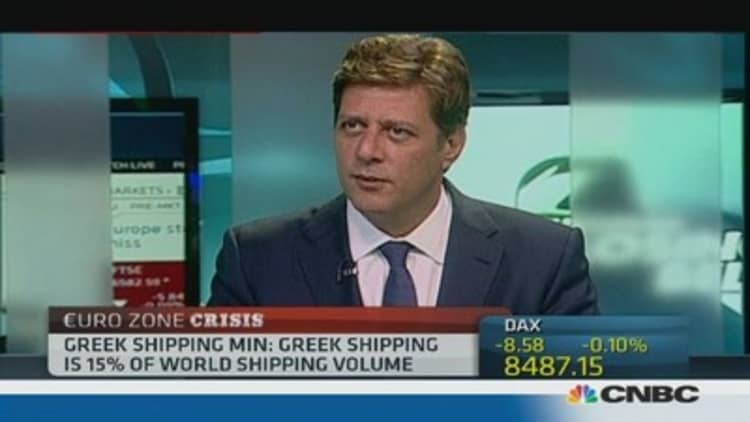After a bumper tourism season this summer in Greece, things appear to be looking up for the country, with economists raising their growth forecasts just a week ahead of bailout inspectors arriving in Athens.
Greece's tourism sector has seen a substantial boost this year, according to Capital Economics' Ben May, with balance of payments data revealing that receipts from travel services were over 20 percent higher than a year earlier.
"The turnaround will largely reflect the fact that the Greek crisis, which depressed tourism last year, has since eased, boosting tourist numbers," May wrote in a note on Tuesday. "Greece will also have benefited from fewer holidaymakers heading to destinations in North Africa and the Middle East this summer."
(Read more: ECB's Draghi rules out debt relief for Greece)
He argued that this strong performance from the tourism industry could help bolster Greece's economy in the third quarter, which he expects to contract by around 3 percent. This is substantially less than the forecast by the "troika" of Greece's international creditors - the European Commission, the European Central Bank and the International Monetary Fund (IMF) - which forecasts a 4.2 percent contraction.

UBS also lifted its forecast for Greece for both this year and next, on the back of "better-than-feared" growth in the second quarter, when the economy contracted by 3.8 percent year-on-year. The bank revised up its full-year forecast for 2013 to a contraction of 3.9 percent, and predicted 0.2 percent growth in 2014.
This came after Greek Prime Minister Antonis Samaras insisted in a speech on Monday that his country would return to pre-crisis levels of growth much sooner than expected.
Samaras conceded that Greece was "not out of the woods", according to Greek newspaper Enet. But he added that far from needing "a couple of decades" to recover, it would take just six years for the country to see similar levels of growth and living standards to those experienced before the debt crisis took hold.
(Read more: Greece's slump will be 'smaller than forecast': PM)
But despite this bullishness, both UBS and Capital Economics stressed the situation remains fragile ahead of the arrival of senior troika figures in Athens. The inspectors will be assessing Greece's implementation of painful austerity measures, before deciding whether to release the next batch of aid for the country.
The IMF now estimates that Greece – which has already been bailed out twice since 2010 - will need an extra 10-11 billion euros ($13.4-$14.7 billion) in aid in 2014-2015, on top of what has already been agreed.
UBS said the "main problem areas" for the troika would likely be Athens' slow implementation of structural reforms, such as the restructuring of the public sector, the country's privatization plans and labor market reform.
(Read more: Greece should never have been allowed to join euro: Merkel)
May stressed that although Greece's tourism sector might boost its economy in the third quarter, it does not mark the start of a sustained recovery.
"Other sectors would need to pick up the baton for any revival in the wider economy to continue beyond the third quarter," May said, highlighting that non-tourism exports, a weak labor market, tight credit conditions and a fragile political situation continued to weigh.
"A tourism bonanza in the third quarter won't alleviate Greece's need for further financial assistance," he added.
—By CNBC's Katrina Bishop. Follow her on Twitter @KatrinaBishop


